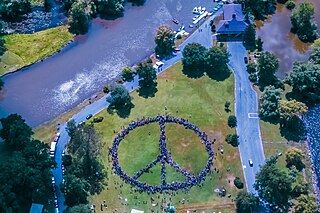Democratic capitalism, also referred to as market democracy, is a political and economic system that integrates resource allocation by marginal productivity, with policies of resource allocation by social entitlement. The policies which characterise the system are enacted by democratic governments.

Peace and conflict studies or conflict analysis and resolution is a social science field that identifies and analyzes violent and nonviolent behaviors as well as the structural mechanisms attending conflicts, with a view towards understanding those processes which lead to a more desirable human condition. A variation on this, peace studies (irenology), is an interdisciplinary effort aiming at the prevention, de-escalation, and solution of conflicts by peaceful means, thereby seeking "victory" for all parties involved in the conflict.
Social exclusion or social marginalisation is the social disadvantage and relegation to the fringe of society. It is a term that has been used widely in Europe and was first used in France in the late 20th century. It is used across disciplines including education, sociology, psychology, politics and economics.
Kumar Rupesinghe was a Sri Lankan academic and activist involved in social issues, particularly human rights, development issues, processes of globalisation, conflict prevention/resolution, and conflict transformation in the light of peacekeeping and peacebuilding for a harmonious coexistence among all peoples in the world.
A fragile state or weak state is a country characterized by weak state capacity or weak state legitimacy leaving citizens vulnerable to a range of shocks. The World Bank, for example, deems a country to be ‘fragile’ if it (a) is eligible for assistance from the International Development Association (IDA), (b) has had a UN peacekeeping mission in the last three years, and (c) has received a ‘governance’ score of less than 3.2. A more cohesive definition of the fragile state might also note a state's growing inability to maintain a monopoly on force in its declared territory. While a fragile state might still occasionally exercise military authority or sovereignty over its declared territory, its claim grows weaker as the logistical mechanisms through which it exercises power grow weaker.
Peace journalism is a style and theory of reporting that aims to treat stories about war and conflict with balance, in contrast to war journalism, which peace journalism advocates say display a bias toward violence. The theory proposes practical methods for correcting biases in stories appearing in the mainstream and alternative media, and suggests ways for journalists to work with other media professionals, audiences, and organizations in conflict.

Peacebuilding is an activity that aims to resolve injustice in nonviolent ways and to transform the cultural and structural conditions that generate deadly or destructive conflict. It revolves around developing constructive personal, group, and political relationships across ethnic, religious, class, national, and racial boundaries. The process includes violence prevention; conflict management, resolution, or transformation; and post-conflict reconciliation or trauma healing before, during, and after any given case of violence.
Metapower is a concept of having control not simply of individuals, but of the social structures themselves. The idea has stemmed from work by sociologists such as Tom R. Burns and Peter Hall, the economist Thomas Baumgartner, as well as by political scientists such as James Rosenau and Stephen D. Krasner. Its study often uses the language of game theory since at some level, having meta-power over a group of people means that one can control the form of the game, thereby controlling the outcome.
Mari Christine Fitzduff is an Irish policy maker, writer and academic. She began her work in peacebuilding and mediation working with universities during the Northern Ireland conflict before setting up a mediation organisation in 1989. In 1990 she was a founding director of the Community Relations Council, set up to help develop and fund peace initiatives in Northern Ireland.

DCAF- ; Geneva Centre for Security Sector Governance is an intergovernmental foundation-based think tank that provides research and project support to states and international actors in improving security sector governance and reform.
The Jubilee Centre is a Christian social reform think tank based in the United Kingdom which conducts research into the contemporary relevance of the biblical vision for society.
Cambridge Papers has maintained a consistently high standard of Christian reflection on contemporary issues.
Creating shared value (CSV) is a business concept first introduced in a 2006 Harvard Business Review article, Strategy & Society: The Link between Competitive Advantage and Corporate Social Responsibility. The concept was further expanded in the January 2011 follow-up piece entitled Creating Shared Value: Redefining Capitalism and the Role of the Corporation in Society. Written by Michael E. Porter, a leading authority on competitive strategy and head of the Institute for Strategy and Competitiveness at Harvard Business School, and Mark R. Kramer, of the Kennedy School at Harvard University and co-founder of FSG, the article provides insights and relevant examples of companies that have developed deep links between their business strategies and corporate social responsibility (CSR). Porter and Kramer define shared value as "the policies and practices that enhance the competitiveness of a company while simultaneously advancing social and economic conditions in the communities in which it operates", while a review published in 2021 defines the concept as "a strategic process through which corporations can turn social problems into business opportunities".
The Centre for Theology and Public Issues (CTPI) is a research centre based in New College, the School of Divinity at the University of Edinburgh. Founded in 1984 by Duncan B. Forrester, CTPI promotes Christian theological reflection and research on important public issues. CTPI research is global in orientation and rooted in the tradition of public theology. Issues are examined by bringing together theologians, social scientists, church leaders, policy makers, artists, and the public. CTPI has particularly close relations with the Scottish Parliament and other institutions of Scottish public life. The current director is Jolyon Mitchell.
The International Centre for Policy Studies (ICPS) is an independent NGO, founded in 1994 which aims to promote public policy concepts and practice and apply them to influential policy research that affects both the public and private sectors in Ukraine.
European Peacebuilding Liaison Office (EPLO) is the independent civil society platform of European NGOs, NGO networks and think tanks which are committed to peacebuilding, and the prevention of violent conflict.
Concordis International is a non-profit organization that works alongside and in support of official peace processes. They exist to improve the potential for lasting peace. The organization has headquarters in London and country-offices in the Central African Republic and Nouakchott, Mauritania. Concordis' historical roots are in peace-building work by the Newick Park Initiative in South Africa (1986–1991) and in post-genocide Rwanda (1994–1997).

The Institute for Justice and Reconciliation (IJR) is a non-governmental organisation and think tank based in Cape Town, South Africa. It was forged out of the country's Truth and Reconciliation Commission in 2000. The aim was to ensure that lessons learnt from South Africa's transition from apartheid to democracy were taken into account as the nation moved ahead. Archbishop Emeritus Desmond Tutu was the patron of the IJR.

Saferworld is an international non-governmental organisation with conflict prevention and peacebuilding programmes in over 20 countries and territories in the Horn of Africa, the African Great Lakes region, Asia, the Middle East, Central Asia and the Caucasus. It was founded in Bristol, UK in 1989 and now has its main office in London.
Peacebuilding in Jammu and Kashmir includes confidence-building measures at a nation-state level between the governments of India and Pakistan, track two diplomacy, as well as initiatives by non-governmental organisations (NGOs), institutes and individuals. The purpose of peacebuilding in Jammu and Kashmir include conflict prevention and reduction of hostilities in the Kashmir Valley. Many countries such as Russia, United States and China have also played a de-escalatory role with regard to tensions in the region.





